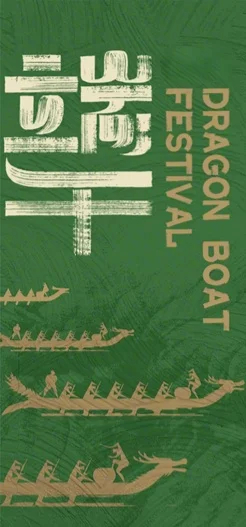- English
- Español
- Português
- русский
- Français
- 日本語
- Deutsch
- tiếng Việt
- Italiano
- Nederlands
- ภาษาไทย
- Polski
- 한국어
- Svenska
- magyar
- Malay
- বাংলা ভাষার
- Dansk
- Suomi
- हिन्दी
- Pilipino
- Türkçe
- Gaeilge
- العربية
- Indonesia
- Norsk
- تمل
- český
- ελληνικά
- український
- Javanese
- فارسی
- தமிழ்
- తెలుగు
- नेपाली
- Burmese
- български
- ລາວ
- Latine
- Қазақша
- Euskal
- Azərbaycan
- Slovenský jazyk
- Македонски
- Lietuvos
- Eesti Keel
- Română
- Slovenski
- मराठी
- Srpski језик
Dragon Boat Festival: Dragon Boat and Rice Dumplings in Chinese Summer
2025-05-30
As China embraces the humid and sultry midsummer, a vibrant and poetic traditional festival, the Dragon Boat Festival (Duanwu), kicks off. The drum beats of dragon boat racing, the fragrance of zongzi leaves, the scent of mugwort at the doorstep ...... This festival is not only a reverence for nature, but also an inheritance of history and culture, and now it has become a window for the world to learn about Chinese civilization.

Origin: Legends in History
The origin of the Dragon Boat Festival is a matter of opinion, but the most touching story is related to a poet named Qu Yuan.
During the Warring States period in the third century B.C., Qu Yuan was a wise minister of the state of Chu, but he was framed by slanderous rumors and eventually threw himself into the river in grief and anger. The people rowed boats to retrieve his body and threw rice balls into the river to prevent fish and shrimp from eating his body. This action gradually evolved into today's dragon boat races and the custom of eating rice dumplings.
Of course, there are other versions in the scroll of history: the people of Wu commemorating the loyal minister Wu Zixu, and the people of Zhejiang celebrating the dutiful daughter Cao'e who threw herself into the river in search of her father. ...... These stories are different, but together they convey the power of loyalty, courage, and affection.
Customs: A Symphony of Tradition and Life
The charm of the Dragon Boat Festival is hidden in its colorful customs:
Dragon Boat Racing: A Water Carnival of Power and Beauty
Painted dragon boats break the waves with their heads high, drummers beat out the exciting rhythm, paddlers shout in unison, and the audience on both sides of the river cheers like a tidal wave. This ancient ritual originating from the rescue of Qu Yuan has now developed into an international event, and dragon boat races can be seen from Sydney to San Francisco.
Rice Dumplings: Cultural Code on the Tip of the Tongue
Wrapped in glutinous rice with emerald green Ruo leaves, filled with red dates, bean paste or salted egg yolk and fresh meat, steamed and fragrant. Northern people prefer sweet and glutinous, southern people love savory, a small dumplings, hiding the wonderful collision of the flavors of China's north and south.
Mugwort and Scented Sacs: Guardians of Nature
Mugwort and calamus are hung in front of every house, and the smell of herbs drives away mosquitoes; children wear hand ropes made of colorful silk threads, with scented sachets containing cloves and mint swaying around their waists - these customs originated from the wisdom of the ancients of “avoiding the five poisons” (repelling snakes, scorpions, and other poisonous insects), and still protect health today. These customs originated from the ancient wisdom of “avoiding the five poisons” (repelling poisonous insects such as snakes and scorpions) and are still used today to protect health.
Disappearing Xionghuang Wine and Modern Innovations
Ancient people drank Xionghuang wine to ward off evil spirits, and even used the wine to draw the word “Wang” on children's foreheads to pray for good luck. Although the tradition has gradually disappeared due to the toxicity of Xionghuang, modern people have invented safer ways to continue the Dragon Boat Festival's concept of health care, such as herbal teas and fragrant sachets.
Cultural significance: resonating across millennia
The Dragon Boat Festival, listed as an Intangible Cultural Heritage of Humanity by the United Nations in 2009, is much more than just a traditional ritual:
Wisdom of the time of the year: the heat and humidity of mid-summer are conducive to epidemics, and customs such as hanging moxa and wearing scented sachets reflect the ancient philosophy of “preventing illness before it occurs”.
Inheritance of family and national sentiments: Whether it is the patriotic spirit of Qu Yuan or the filial piety of Cao E, the festival always conveys the moral values of oriental culture.
The living legacy of folklore: from rural dragon boat races to urban cultural and creative bazaars, traditions are taking on new forms to attract the younger generation. Young Chinese are even designing scented sachets as fashion accessories and recording the fun challenge of wrapping zongzi in short videos.
Dragon Boat Festival in Global Perspective
Nowadays, the Dragon Boat Festival has long transcended national boundaries:
International Dragon Boat Races: From Lake Geneva in Switzerland to Vancouver in Canada, more than 50 countries organize dragon boat races, serving as a bridge for cultural exchange.
Dumplings of the world tour: Thailand's coconut dumplings, Vietnam's banana dumplings ...... East Asian countries have their own “dumpling variations”.
Cultural Experience Boom: Every Dragon Boat Festival, foreign tourists often flock to Miluo, Hunan Province (where Qu Yuan threw himself into the river) and Jiaxing, Zhejiang Province (the hometown of rice dumplings) to make rice dumplings with their own hands, learn how to row a dragon boat, and feel the temperature of the Chinese festival.


